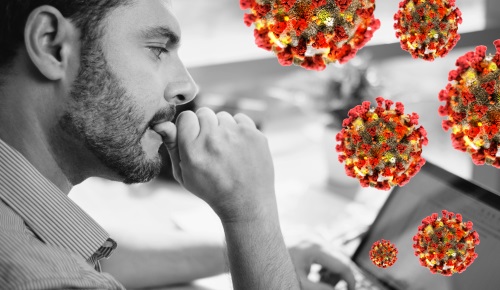Managing anxiety during the COVID 19 outbreak

COVID 19 continues to spread, and efforts to contain it have led to profound disruptions in many of our lives. For students of all ages in-person classes have been canceled, teachers are asked to transfer their teaching to on-line platforms, schools and businesses are closing, and we are instructed to engage in “social distancing” to prevent the transmission of the virus. This potential threat about which we have limited information, rapidly changing and disrupted routines, along with distance or the threat of distance from loved ones are the types of situations that easily contribute to many of us experiencing anxiety. And for those who struggle with anxiety even before these recent circumstances the current environment can certainly make that worse.
Anxiety is a feeling of fear in response to a perceived threat, and usually comes along with thoughts or beliefs that this situation is beyond our resources or ability to cope.
Anxiety is a feeling of fear in response to a perceived threat, and usually comes along with thoughts or beliefs that this situation is beyond our resources or ability to cope, which is why we feel overwhelmed when anxious. We experience anxiety through physical symptoms such as sweating, increased heart rate, or upset stomach. Anxiety might show up as racing thoughts, mental confusion, avoiding things, freezing, or an inability to decide on the best course of action. Anxiety may also lead to consequences which impact interpersonal relationships as we tend to become irritable and preoccupied with ourselves when we’re anxious.
But anxiety can also be adaptive. As organisms we experience anxiety for good reasons. In optimal doses anxiety can motivate us to action. Because of anxiety we prepare for the unexpected and, sometimes for the worst-case scenario. Anxiety helps us pay attention and increases our focus, as our senses become more watchful for evidence of the potential threat. It also reminds us that we perhaps need to protect ourselves from some real harm.
So, how can we use the adaptive capacity of our anxiety to help us cope with the current threat? Well, in fact, there are lots of ways that we can use the adaptive capacity of our anxiety while managing the less adaptive aspects of our anxiety.
Does this information help me feel prepared and armed with knowledge or helpless and more anxious?
Intellectual Curiosity. Many of us will spend a great deal of time following the spread of the novel coronavirus and the public health response on social media, getting each moment's play by play, and consider ourselves informed. Managing your anxiety, however, may require that you spend less time following social media posts about this health crisis, and more time actually learning about it. Limit your time on social media platforms that offer endless discussions about the spread of the virus. Ask yourself, “Does this information help me feel prepared and armed with knowledge or helpless and more anxious?” Useful knowledge helps us feel prepared and guides us toward developing a plan to respond to the demands of the situation. Intellectually learning about the virus from reputable sources; how it spreads and how to decrease risks associated with it, helps us to prepare; whereas endless speculation on Facebook and other social media platforms may diminish efficacy and increase paralysis.
Anxiety often makes us want to DO something. So, go ahead and DO something. No, you can’t do anything about the virus. But there are many things that are under your control.
Action. Anxiety often makes us want to DO something. So, go ahead and DO something. No, you can’t do anything about the virus. But there are many things that are under your control. For example, make a list of small businesses in your area that you’d like to support through this crisis. Many small businesses may need to close at some point or will have fewer customers. See if you can buy a gift certificate from them on-line to help support them through this.
Take action related to your health. Sleep, nutrition and moderate exercise all help our mental health and our immune systems. Take these steps to build resilience. If you’re stuck at home, identify a project you’ve been putting off or neglecting and take action.
Exercising the feeling that we have some choice and some control helps decrease anxiety. Identify one thing that you can take action on and do it. For those oriented toward social action, call your representatives and ask them to support policies that protect and support vulnerable citizens during times like these.
Altruism. Doing something for someone else is a powerful antidote to anxiety. Anxiety triggers our survival response system causing our perspective to narrow. As our perspective narrows we become even more anxious and a self- perpetuating cycle of anxiety begins. Focusing on helping others, automatically shifts and widens our perspective to include other people, other information, and other input besides our own fear-based thoughts. Widening our perspective helps to decrease our anxiety. Those of us who are social workers or in other helping professions know the experience of greater expansiveness and decreased repetitive anxious thoughts when focusing on others. So, give yourself that experience and ask yourself, “Who can I help today?” Do you know someone who will have trouble getting to the store to buy supplies? Can you do it for them? Do you know someone who lives alone and may be even more isolated as social events are increasingly canceled? How can you help them feel less lonely? Research tells us that altruism helps the help giver as much as the help receiver.
Gratitude. The Zen monk and mindfulness master, Thich Nhat Hanh asks a profound question, “What’s NOT wrong?” Anxiety causes us to scan our bodies and our environment for whatever is wrong, internally or externally. Let’s face it, if we’re always looking for something that’s wrong we are bound to find something. The question, “What’s not wrong in this moment?” allows us to focus our minds on searching for whatever is OK in this moment. Once you identify those things that are OK in this moment, or even pleasant in this moment; cuddling your child; petting your dog; hearing your favorite song; concentrate on savoring it. Focus your attention on that pleasant experience using all of your senses in the moment. Marvel in the delight of having the experience. Consider it an exercise. The more you practice it, the easier it becomes and the less room there is for anxious thought processes.

Being in the moment. Mindfulness is another tool that can help us recognize when we are feeling anxious. It can help us respond wisely rather than react rashly to anxiety. Mindfulness refers to the act of paying attention in the present moment with an attitude of curiosity and non-judgment. The following are some exercises for mindfulness during stressful times,
- Just this moment: When you are feeling overwhelmed by information about the virus, take a moment to pause, stop and, listen. Think about just this moment. What is happening in your environment in this moment, with you? Notice how you feel-physically and emotionally. Use your senses to notice what is around you. Welcome difficult moments with friendliness and curiosity. Try to take one moment at a time.
- Mindful walking: Take some time to go for a mindful walk in nature, whether that’s in your neighborhood or in the woods. This can be helpful if you’re feeling cooped up inside or need to get out of a ruminating thought pattern. Feel the fresh air, even if it’s cold. Notice the first signs of spring, like- buds on trees and green shoots in the soil. Notice the rise and fall of your feet, your gait, the movement of your arms and legs. Notice your breath. Have gratitude for the ways your body is able to move.
- Do just one thing: This can be a chaotic time, with many situations in your family, at work, and in school changing rapidly. Remind yourself to focus on one thing at a time. What can you take action on in this moment? What can you let go of until another day? Do you need to ask for help?
- Radical acceptance: Taking the approach of radical acceptance can be important when dealing with an overwhelming situation. It is about recognizing and accepting the truth of the situation, even if it is difficult. It is about letting go of fighting to make things out of our control different. It’s also no longer burying our head in the sand. For example, it is not continuing with our daily routine like nothing has changed. Many of our typical routines have now changed, but this doesn’t mean barricading yourself in your house with a month’s supply of food either. It is not passive resignation. It is recognizing what is and where we can act and respond according, such as through the Action or Altruism points above. It is realizing what is out of our control, but also what is within our control.
- Breathe: Notice your natural breathing. With anxiety, our breathing tends to be shallow and only in our upper chest. Don't judge how you breathe or if it’s hard to notice it. Take a few moments to become aware of it. If you’re able, try to breathe in through your nose and out through your mouth with a big sigh. Do this a few times and see if you can slowly lengthen and deepen your breathing. Try making your exhale longer than your inhale, which can activate the parasympathetic nervous system (our “rest and digest” mode of our autonomic nervous system). Visualize your lungs filling with air on the inhale and emptying on the exhale. Place one had on your heart and one on your belly, noticing any gentle movements (and it’s okay if it’s hard to notice anything!). Notice the gentle weight of your hands on your body and use this soothing touch to give yourself compassion.
- Compassion: Can we meet our anxieties and our struggles with compassion, knowing what we’re feeling is a normal response to a stressful situation, rather than judging or fighting against our feelings? This is a time to treat ourselves and others kindly, recognizing that we're in a moment of suffering, we're all dealing with this together and, that we're trying the best we can. Take a moment right now to notice how you feel in your body and emotions. Remind yourself it is okay to feel however you are feeling. Perhaps talk to yourself in a gentle, soothing way, like you would soothe a small child.
In the end, while we may have little control over our circumstances, we do have control over our responses. Compassion, presence in the moment, altruism, and action align with our social work values, and offer powerful responses to our present circumstances.
 Suzanne Brown, PhD, LMSW is an associate professor of social work at Wayne State University whose research and writing focuses on traumatic stress, substance use disorders, interpersonal relationships, and clinical social work practice. Learn more about her teaching, research and community engagement at the Wayne State School of Social Work.
Suzanne Brown, PhD, LMSW is an associate professor of social work at Wayne State University whose research and writing focuses on traumatic stress, substance use disorders, interpersonal relationships, and clinical social work practice. Learn more about her teaching, research and community engagement at the Wayne State School of Social Work.
 Caitlin Brown, LMSW, E-RYT 200 is a social worker, yoga and mindfulness instructor, and yoga therapist in training, with 10 years of teaching experience. She teaches yoga and mindfulness classes at Wayne State University and in the community, and conducts trainings for social workers and other professionals. Learn more about her work at Mindful Detroit.
Caitlin Brown, LMSW, E-RYT 200 is a social worker, yoga and mindfulness instructor, and yoga therapist in training, with 10 years of teaching experience. She teaches yoga and mindfulness classes at Wayne State University and in the community, and conducts trainings for social workers and other professionals. Learn more about her work at Mindful Detroit.
Suzanne Brown and Caitlin Brown serve as co-trainers on a grant funded by the Michigan Department of Health and Human Services called the “Mindfulness Interventions for Working with Individuals with Opioid Use Disorders”. The grant offers practitioners and peer support specialists an opportunity to learn current evidence-based interventions for helping individuals with opioid use disorders. These specialists, may not otherwise have access to the latest information on evidence-based interventions due to an under-resourced healthcare workforce. Learn more about this and other research that empowers social change in Detroit at the Center for Social Work Research.